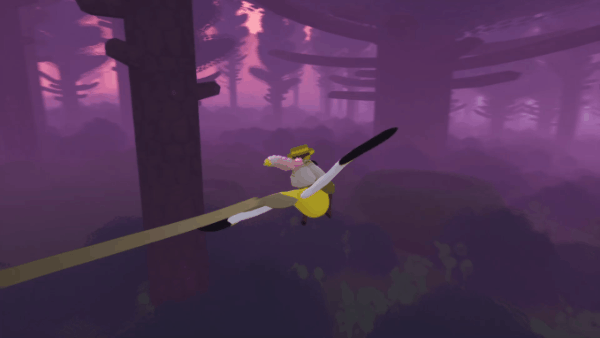Trending
Opinion: How will Project 2025 impact game developers?
The Heritage Foundation's manifesto for the possible next administration could do great harm to many, including large portions of the game development community.

Brian Eno meets Hohokum with a pinch of Pauline Oliveros and a dash of Ulla Straus. It's a delicious, delirious recipe–and one that composer Eli Rainsberry leaned into when concocting the tranquil, hazy score for Hollow Ponds' latest release, Flock.
This isn't Rainsberry's first rodeo. The IGF-nominated composer and sound artist previously cultivated the scores for Wilmot's Warehouse, Saltsea Chronicles, No Longer Home, and A Monster's Expedition. For their latest opus, Rainsberry had to craft something both meditative and dynamic. A soundtrack that could embody the unpredictable verve of bird flight and the quiet serenity of a watercolor sunset.
Speaking to Game Developer over email, they explain there are two signature soundscapes that comprise Flock's musical palette. One was ambient and spacious, and the other was more upbeat and vibrant. It's a combination partly inspired by Flock's spiritual prequel, Hohokum, but Rainsberry was keen to avoid creating an obvious pastiche.
"The ambient side of things was one of the very first things I explored as part of the process of developing Flock's soundscape. I initially leant into more subtle, constant drones akin to the sort of works from Eno until we felt like we wanted to go more spacious, and letting things breathe where possible, ultimately aiming to figure out more of the sense of space, bedding the music more into the ambience," they explain.
"I regularly bounced off feedback with the creative leads (Ricky Haggett, Dick Hogg), plus our sound designer (Dan Pugsley) who I collaborated closely for some of the music design and implementation. This was the first project I was on with that kind of collaboration since I tend to act as audio lead on most of my other projects. But I was pleased that during a lot of the time on production, there was music that I was able to compose first passes on that made it into the game with not much feedback, and to have that trust built up already–especially from after working on Wilmot's Warehouse before with Ricky and Dick–meant a lot to me, there."
In scoring for the world of Flock–a picturesque dreamscape filled with offbeat creatures–Rainsberry was adamant that players needed space. Their score should accentuate the landscape around players, not overshadow it.
"When I scored to support the world of Flock, I wanted to make sure that there was a lot of space made to allow folks to take a breath in hearing the distant calls of these creatures, the ambiences of the trees, grass and streams. I think there’s power in how you use silence or at least quiet interludes when arranging music in a space like this," they note.
"For each area of the world, I used different sets of synthesised textures and pads that I felt resonated with each space or [...] liked how they sounded against certain melodies that’d play in those areas. The Lupin Fields, for example, would feel a little different to the Grasslands with some textural and melodic changes, making sure they had different sonic identities. I also had a set of instruments that were more acoustic–stringed and plucky to layer on top. Having day and night cycles in the game, only the acoustic layers would phase out during the night."
Rainsberry felt that blending electronic elements with woodwinds and strings would help layer in texture. The organic and synthetic swirling together to create a sound that feels both familiar and distinct–much like the myriad of creatures players will encounter in on their travels across the Uplands. It also pushed them outside of their comfort zone, with Rainsberry previously leaning more heavily on "purely electronic" sounds.
"I wanted to revisit my approach to writing for woodwinds and strings. My use of woodwinds, where you'd hear flute, clarinet and saxophone lines in places, felt somewhat 'on the nose' [...] for a game that’s about riding through the winds of fields and grasslands. [So] I used these predominantly for the rarer creature chase tracks and stings, where I thought it’d be a neat way to give each rarer creature, such as the Emperor Cosmet, a support for its voice and calls. I found that there was something quite earthy about woodwinds generally that made me want to try using that palette of instruments a lot more," they add.
"Finding the right balance for came from experimenting between those textures and instruments, with some prioritizing of certain melodic woodwinds and any little arpeggiated patterns I tend to make. I’m also a sucker for reverbs and experimenting with the different ways my presets get processed (Valhalla's Vintage Reverb has been a big favourite for me recently, though Logic’s own Space Designer I still use), so I sometimes use them on select acoustic instruments and EQ/low pass in a way that sounds more close to a synth pad with extra texture. [This] helps bring a little balance for tracks with less synth instruments."
Flock is unashamedly laid back, but it also has heart and humor in abundance. Capturing the latter proved particularly challenging for Rainsberry, who admits they struggle with writing more comedic beats. "It's finding the timings of certain bits, making some sounds a little goofy while still considering the world we're in," they say, outlining the task at hand.
There are moments in Flock where players will need to capture Burgling Bewls, pesky little creatures that have smuggled away some very important whistles. Apprehending those cheeky Bewls and collecting whistles allows players to attract new creatures and bolster their flock. It's a core part of the gameplay loop, but scoring those moments of lighthearted victory proved difficult.
"When I struggle with these sorts of things, I always defer back to listening and watching references from other media that I enjoy to see if anything would resonate with what I’m doing, and maybe suit the humor of what I want to go for more," says Rainsberry.
"As someone who’s really into their animation (support The Animation Guild as they prepare to strike in the future by the way), I tend to watch those more for inspiration, especially shows like Adventure Time. I always admired how far out and abstract the music would go [in Adventure Time] while still remaining really funny to me. Its music would also be frequently something I'd listen to for Flock."
Eventually, Rainsberry decided to play around with sounds that some might perceive as too immature for game scores. It was a big swing, but one that helped capture the essence of those brazen Burgling Bewls. "I played around with instruments that’d typically be deemed as a little childish or goofy, some that’d pitch shift a little funny," they explain. "Xylophones can be cute and fun to create some little chromatic stings and riffs here and there. [...] For example, I synced some mouth pop-like sounds to when the Bewls steal those whistles during an early game cutscene."

Discussing the more practical side of composition, Rainsberry explains the Flock score relied heavily on a mix of instrument libraries such as Native Instruments' 'Massive' and 'Reaktor.'
"There was a fair bit of FM synthesis with NI's 'FM8' and u-He's 'Repro 5' too. Those two in particular were go-tos in terms of shaping that part of the sonic soundscape," they say. "Repro's instruments were great because I was able to tag and assign them as favourites to use for specific projects. I had a few to pick and expand on for Flock especially, so they helped support some of my workflow that way.
"The other acoustic and woodwind instruments I used included Westwood Instruments' 'Untamed' suite, where the instruments recorded were more improvised and expressive. The higher the velocity raises, the more chaotic they get. That being said, I quite liked having them at a medium to low velocity since they still brought out breathy, murmured textures that I felt rested well against the synth pads I built up."
Despite their penchant for electronica, Rainsberry says they're a guitarist at heart and explains some of their acoustic recordings can be heard in tracks like 'To the Hilltop' and 'The Water Towers.' They also created sonic sketches on keyboard during production to help turn raw concepts into more tangible ideas. All of those building blocks were then assembled in Logic Pro, which Rainsberry explains "has always been how I've composed and arranged."
"[Logic Pro] has always supported my workflow generally by letting me build a library of presets for each project," they continue. "I can just select them and either use them or work something else out from there. Part of the process for me generally is layering up different sounds, textures, and harmonies and hearing what works and compliments each other–it takes a bit of time and I feel like so much of my ‘writing’ is trialling and erroring different combinations of them, but I think it’s worth it for me in the long run, especially when it comes to the mixing and mastering stages."
They suggest their approach to mixing and mastering is still a work-in-progress, and says that with Flock they tried Match EQing as close as possible to a handful of reference tracks. We suspect it's a sentiment most creative types can relate too. Perfection is always situated just beyond the veil, but in the case of Flock's blissfully understated yet soaring score, we think Rainsberry has come as close as you could probably get.
You May Also Like